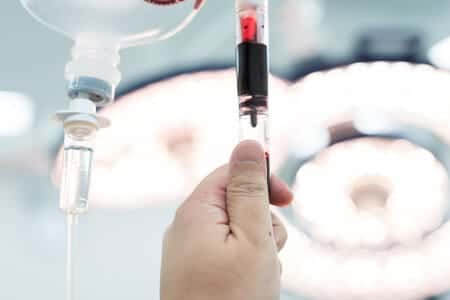Hematology Experts Evaluate Transfusion of Contaminated Blood Products to Cancer Patient
Updated on
This case involves a patient who received blood products while hospitalized and receiving a regimen of chemotherapy for a rare form of blood cancer. It was found that the blood products were contaminated with a virulent strain of harmful bacteria. The contaminated blood products, observed through a flow cytometry test, caused the patient to fall into severe septic shock within a day of receiving the tainted transfusion. In order to combat the infection, the patient was transferred to the intensive care unit, where he received around-the-clock medical support. In order to ensure that he was able to recover from the infection, the patient’s cancer treatment was discontinued for a period of months. This approach was instrumental in ensuring the patient’s survival, however, the lack of chemotherapy during his recovery was allegedly responsible for a recurrence of his cancer. In addition, the patient was no longer a candidate for a bone marrow transplant due to his infection.
Question(s) For Expert Witness
1. Are you familiar with the screening process at a blood bank and/or at a hospital lab to assure that contaminated blood products are not transfused into patients?
2. In general, if a patient with cancer receives contaminated blood products and becomes septic, does it compromise their candidacy for bone marrow transplant?
Expert Witness Response E-059088
 I have been formally trained in this area as a fellow of the Royal College of Pathologists. Additionally, during my 5 year hematology fellowship training, I spent 6 months working full time at the IBTS (Irish Blood Transfusion Service) during which time, I routinely delt with issues relating to contaminated blood products. If a cancer patient receives a contaminated blood product, the outcome and subsequent limitations on treatment depends on the nature of the contamination. These are myriad and will influence outcome depending on etiology. For example, bacterial contamination of a blood product is almost universally fatal. There are other scenarios, where the contaminant is benign and does not influence the clinical outcomes. I have published extensively in the area of blood cancer, both in the clinical and basic science arenas. It is worth noting that contaminated products can be transfused without negligence.
I have been formally trained in this area as a fellow of the Royal College of Pathologists. Additionally, during my 5 year hematology fellowship training, I spent 6 months working full time at the IBTS (Irish Blood Transfusion Service) during which time, I routinely delt with issues relating to contaminated blood products. If a cancer patient receives a contaminated blood product, the outcome and subsequent limitations on treatment depends on the nature of the contamination. These are myriad and will influence outcome depending on etiology. For example, bacterial contamination of a blood product is almost universally fatal. There are other scenarios, where the contaminant is benign and does not influence the clinical outcomes. I have published extensively in the area of blood cancer, both in the clinical and basic science arenas. It is worth noting that contaminated products can be transfused without negligence.
About the author
Joseph O'Neill
Joe has extensive experience in online journalism and technical writing across a range of legal topics, including personal injury, meidcal malpractice, mass torts, consumer litigation, commercial litigation, and more. Joe spent close to six years working at Expert Institute, finishing up his role here as Director of Marketing. He has considerable knowledge across an array of legal topics pertaining to expert witnesses. Currently, Joe servces as Owner and Demand Generation Consultant at LightSail Consulting.
Subscribe to our newsletter
Join our newsletter to stay up to date on legal news, insights and product updates from Expert Institute.
Sign up nowFind an expert witness near you
What State is your case in?
Subscribe to our newsletter
Join our newsletter to stay up to date on legal news, insights and product updates from Expert Institute.



